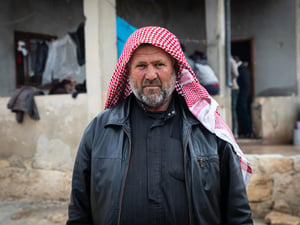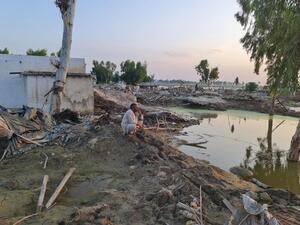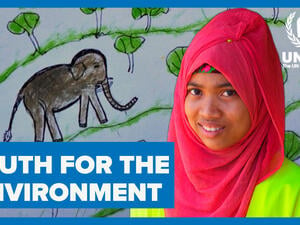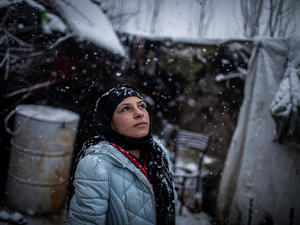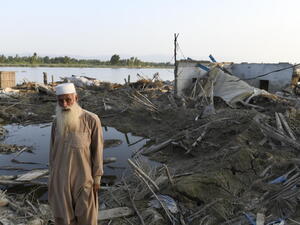Heavy floods devastate displaced and host communities in Sudan
Heavy floods devastate displaced and host communities in Sudan
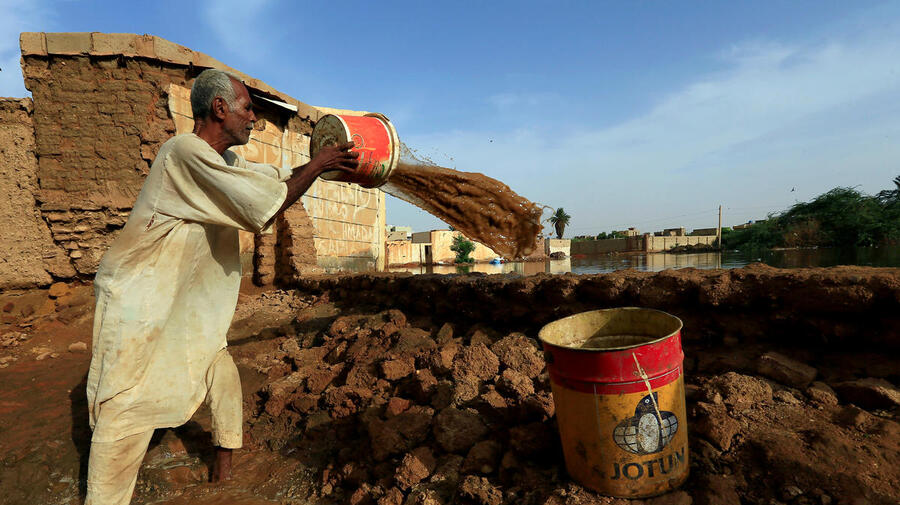
A resident removes buckets of waters from the Blue Nile floods within the Al-Ikmayr area of Omdurman in Khartoum.
Heavy seasonal rains have caused flash floods and rivers to burst their banks, including the Nile in the capital Khartoum and its twin city Omdurman, and affected thousands of internally displaced people, refugees and host communities in Sudan.
Homes and community buildings have been badly damaged and destroyed leaving many in desperate need of shelter. Some have lost all their previous possessions and have been left facing the prospect of starting over again from scratch.
Hygiene and sanitary levels have plummeted due to flooded latrines and contaminated water supplies, preventing people from exercising necessary COVID19 prevention measures such as regular handwashing. Some health facilities have been damaged, hampering their abilities to treat patients should transmission of COVID19 or other viruses and diseases increase.
Many of those affected had been previously displaced by conflict and were already facing loss of income due to the economic challenges related to the COVID-19 pandemic. They are now struggling to meet even their most basic needs.
An estimated 125,000 refugees and internally displaced people have been affected in total, particularly in East Sudan, White Nile, Darfur and Khartoum, many in urgent need of shelter and other emergency assistance. Rains have been particularly heavy in North Darfur, leaving an estimated 35,000 IDPs, locals and refugees in need of help, and where 15 people have tragically died and a further 23 gone missing.
In Khartoum’s ‘Open Areas’ on the outskirts of the city, many South Sudanese refugees were living in make-shift homes and are in dire need of shelter. UNHCR is deeply saddened at the death of an 18-month old refugee girl who drowned in a collapsed latrine.
The damage to infrastructure has been devastating. Roads have become too muddy for traffic to pass, making it extremely difficult or impossible to deliver humanitarian aid to some communities, particularly in Blue Nile where international humanitarian agencies are unable to reach some 5,700 people needing assistance.
UNHCR and partners, in collaboration with the Government of Sudan, are providing emergency aid to affected populations in White Nile, including plastic sheeting to 3,500 refugees in Al Jameya camp and 65,000 other displaced and host community in the state.To mitigate flooding in the camp, UNHCR, in partnership with the host community and refugees, unblocked some drainage channels with a tractor to restore the flow of water.
Further emergency assistance is set to be provided to communities in East Darfur, Khartoum, South Kordofan and East Sudan in the coming days and weeks.
Even before the floods, funding remained far from the levels needed to provide people with the support they require. This year, UNHCR has received just 38% of the US$ 274.9 million needed for our operations in Sudan, and we urge the international community to come forward with further financial support to provide humanitarian assistance to displaced communities in Sudan.
For more information on this topic, please contact:
- In Khartoum, Roland Schönbauer, [email protected] +249 912 179 387
- In Nairobi, Dana Hughes, [email protected] +254 733 440 536
- In Geneva, Charlie Yaxley, [email protected] +41 795 808 702
- In New York, Kathryn Mahoney, [email protected] +1 347 443 7646

